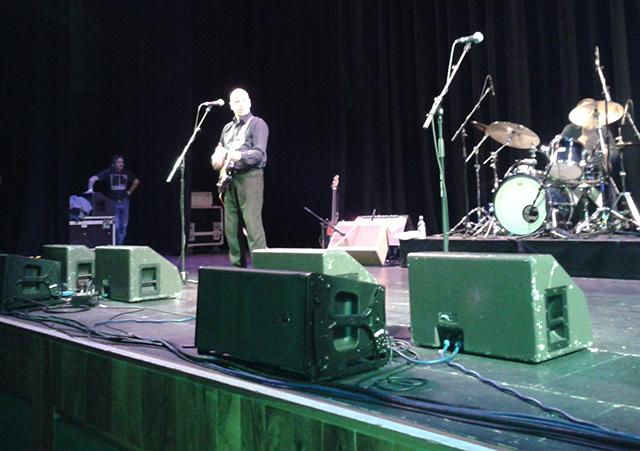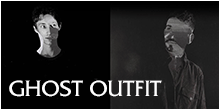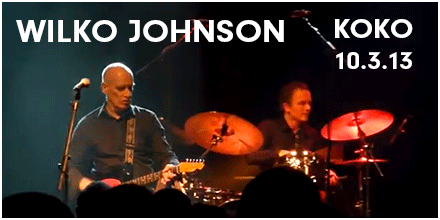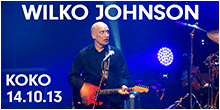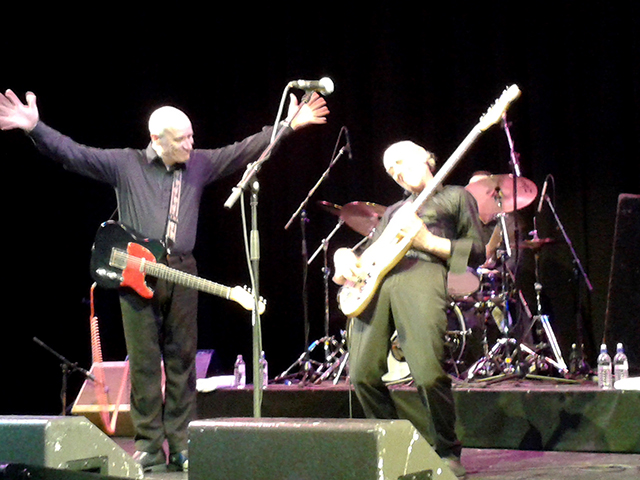
Wilko Johnson
G-Live, Guildford – 6th February 2014
Wilko Johnson was always a bit of a fuck-up. Perhaps it was him being so that helped underscore his legendary status, as his shock departure from Dr. Feelgood at the height of their popularity meant that, unlike the rest of the band, he never experienced the bad years when the Canvey Islanders fell from grace into yesterday's news, overtaken in public regard by the mass of punk and new wave bands that, ironically, the Feelgoods had helped to inspire in the first place. Instead he became a peripheral figure on the music scene, not knowing what to do with himself, lurking in the shadows with everyone waiting for the day Wilko would be reunited with Lee and the two Johns to once again set the world on fire. Of course it never happened though in everyone's mind Wilko always remained Dr. Feelgood's guitarist ... and that was all Wilko ever really wanted to be.
The split was never down to musical differences but to lifestyle choices. Wilko spent the band's formative years doped out of his brain while the other Feelgoods spent their lives in the bar. This detachment was exacerbated by drug-induced paranoia and alcohol-fuelled aggression, and led to a sneaking suspicion on both sides that something was badly amiss. Of course, being English, they never talked about their feelings and both sides spent the next few decades unable to make the first move of reconciliation as they both felt they had been wronged. Which was a terrible shame as it would probably only have taken a ten minute chat ....
It was a ludicrous end to a band of major importance. Dr. Feelgood had been the first group to lash out in defiance at the weedy state of the music industry in the mid seventies, infused with progressive rock horrors with their interminable, twiddly solos and songs about hobbits. Embracing the electric blues from the Mississippi Delta and Chicago they produced a thrilling raw sound that was a shot in the arm to those desperate to escape from the blandness, pomposity and timidity of it all. And though Lee Brilleaux was a fantastic front man: mean, aggressive and sending chills down your spine with his hawk-like glare, it was Wilko who always stole the show, flashing round the stage like a lunatic, eyes fixed in a thousand yard stare, and impossibly drumming out lead and rhythm at the same time on his black and red Telecaster. They were the saviours, lighting the path to the promised land, rising from small pub gigs to number one albums ... until they fucked it up.
Wilko's latest fuck-up is dying. Diagnosed with terminal cancer some time ago, he put on two emotional farewell shows at the Koko in Camden last March when black market tickets went through the roof and the old venue was busting at the seams with those desperate to catch a last glimpse of a very real hero at work. There were two more farewell shows in October, the month he had expected to die, which were followed by the recording of a new album with Roger Daltrey, three sell-out dates in Tunbridge Wells this year and now this appearance at the shiny G-Live in Guildford. Still to come, Wilko and his band will be supporting the reformed Status Quo on their UK tour. It's great to see the old bugger still with us and it's good that he's stopped using the term 'farewell' to mark these shows. It seems Wilko is going to be hanging around for quite a while yet.
All this changes the mood quite a lot. The venue, half seated and half standing, is packed to the rafters yet again, but there is a more celebratory feel to the show and it doesn't feel like a goodbye. We already have tickets to see him again in London, so the shadows have seemingly moved far away. This means we can relax and simply enjoy watching one of this country's greatest performers in action, and marvel at the abilities of his small band. If there is a better bassist anywhere than Wilko's former Blockhead colleague Norman Watt-Roy, then we have yet to see them, and Dylan Howe is a class drummer. The sound is terrific, helping the audience to appreciate their virtuosity and Wilko flies around the stage in his familiar way raising cheers from every side as he glides to the edge of the stage, staring madly out at nothing. The set, also, is little changed, having now become finely honed through repeat performances. There is every Feelgood classic you would hope for, with the addition of 'The More I Give' which he hadn't played at his previous shows. 'Roxette' is once again slimmed down, while 'Don't Let Your Daddy Know' is dragged out to let Wilko's bandmates take the limelight. Not that they are ever outshadowed. Watt-Roy in particular is mesmerising as he plays more notes than ever existed in half of the songs, happy to carry the lead while Wilko chops out the rhythm.
The man himself is in fine fettle, leaving the chat to a minimum and merely throwing in a few words of thanks. He does elaborate before setting off into the grand finale of the set, however, by introducing 'Back In The Night', a tale of insatiable sexual adventures, with the words, "I wrote this song thirty-seven years ago. It's funny how it's still relevant today." The band leave the stage to rapturous applause and are quickly out for the traditional encore of 'Bye Bye Johnny'. Obviously time is pressing and as the audience are screaming for a second encore, the house lights come on. Shiny G-Live obviously has its curfew and crappily it is only nine forty-five. So, no proper goodbye this time and no lump in the throat, just a very sore one through singing all night and shouting like a teenager. But that's the glory of Wilko and we look forward to the next time. Unless, of course, he fucks that one up.
Words and poor camera phone pics, Adam
